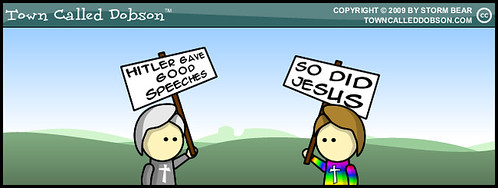 click to enlarge Maybe more of you do know about this than I imagine. After eight years of Bush, I too feel like I have had a mouth full of musty balls. Although thoughts of Cheney moaning "wreck it" sends me running to hug some porcelain. Back to the misguided meme. The Libertarians had a decent idea to protest taxes - tea, protest signs and genuine outrage. Then the GOP caught wind of the idea and took it right off the ship and into the deep murky waters if idiocy. "Let's call it teabagging!" With whatever "brand movement" the Libertarians had generated with their protest idea was ruined overnight by the GOP, who only wants to lift taxes for the rich, no one else. Let's all write on the chalkboard, Bart Simpson style, "Obama signed the largest middle class tax cut in history." Yeah, do that several hundred times. Then the true wingnut freaks were pushed over the edge by the Glen Beck's on-air crying, Oral Roberts style. I kept expecting Glen to whimper, "Father I have sinned against you." Maybe Glen has that nutsack taste in his mouth also? Once the winguts got involved, it all went to total hell. You have protesters with signs ranging from "The ONE was born in Africa" to "Hitler gave good speeches too!" and other assorted, full-throttled nonsense. I have always said freedom of speech is a two-way street. Yes you can say anything you want, it will also let everyone around you know if you are an ass or not. The GOP is showing you an example of who they really are (again) - miserable at coming up with ideas and miserable at giving a shit about the middle class. Remember what they are protesting today - "Obama signed the largest middle class tax cut in history." |
Wednesday, April 15, 2009
Father and Son go Teabagging
Posted by
Storm Bear
at
9:00 AM
0
comments
![]()
Labels: cartoons, comics, gop, humor, politics, sex, teabagging, webcomics
Sunday, April 12, 2009
The Democracy Index: An Interview With Law Professor Heather Gerken
“This index should take what Ohio State University law professor Daniel Tokaji calls a ‘moneyball approach.’ The word ‘moneyball,’ of course, refers to Michael Lewis’ book of the same name about the success of the Oakland A’s after management substituted hard numbers and empirical research for the gut-level judgments of baseball scouts in making hiring decisions.Gerken further described her Democracy Index proposal and identified the major obstacles to good election practices with her new book, The Democracy Index: Why Our Election System Is Failing and How To Fix It (Princeton University Press). Her book is an accessible 181 pages and postulates that we need more facts about our election practices and that a ranking metric is our best hope to facilitate accountability and reform. Gerken also contends that our broken electoral system has less to do with intended malice than “deferred maintenance,” a term typically applied to failed infrastructure such as broken bridges. Shortly after Gerken’s LegalTimes article was published, Both Barack Obama and Hillary Clinton, put her concept into proposed legislation and within a year, Congress set aside $10 million to fund model data collection programs in five states and the Pew Center. Other foundations also sponsored conferences and initial research. On March 1, 2007, Obama referred to these initiatives on the Senate floor as, “an important first step toward improving the health of our democracy. We are all familiar with the problems that have recently plagued our elections: Long lines, lost ballots, voters improperly turned away from the polls. These are basic failures of process. Until we fix them, we run the risk in every election that we will once again experience the kind of chaos and uncertainty that paralyzed the nation in 2000. We can do better. We must do better. But to do better, we need more than anecdotal information. We need better, nonpartisan, objective information.”Hence, Gerken's efforts illustrated at least the potential for action from the body politic to facilitate electoral reform but obviously, more needs to be done. With respect to electoral law, Gerken is among the most authoritative voices in the country. In 2006, Gerken joined the Yale Law School faculty where she teaches election and constitutional law. Previously, Gerken clerked for Supreme Court Justice David Souter and was an assistant professor at Harvard Law School, where she was granted tenure and won the Sachs-Freund teaching award. She has also written for the New Republic, Roll Call, and Legal Affairs and has been a frequent media commentator. Gerken was among several commentators who appeared on Charlie Rose’s program the very evening the Supreme Court rendered its fateful decision in Bush vs. Gore. During the 2008 presidential election, Gerken served on Barack Obama’s election protection team. Gerken agreed to a podcast interview with me over the telephone about her book and proposal for a Democracy index. Our conversation was just over seventeen minutes and can be accessed via the flash media player below. This interview can also be accessed at no cost via the Itunes Store by searching for either “Intrepid Liberal Journal” or “Robert Ellman.” |
Posted by
Robert Ellman
at
12:51 PM
0
comments
![]()
Labels: barack obama, Democracy Index, Heather Gerken, hillary clinton








